Chris Baty's Blog, page 86
January 14, 2019
How NaNoWriMo Taught Me to Love Writing as an Adult

Sometimes, growing up makes your childhood passions harder to pursue. It can be difficult to find the same kind of time or energy to invest in them. Today, writer and NaNoWriMo participant Alexandra Caulway shares how NaNoWriMo helped her rediscover her passion for writing as an adult:
When I was a child, writing was as natural as breathing. I would sneak in words before dance class. Scribble in my notebook before bed. Type furiously on the computer in a desperate attempt to get all my ideas out. My stories existed, unfiltered, because I was not afraid to write them.
As I grew up, writing became more of a “have to” and less of a “ want to.” I was in Advanced English and poetry classes, always coming home with an assignment that someone else wanted me to create. Don’t get me wrong—I loved those classes—but my ideas were now structured by a curriculum.
This pattern continued in college. I decided to go to school for writing and communications, intending to be a journalist (spoiler alert: I ended up creating social media content for a living instead). It goes without saying that learning “how to write” for four years meant I was writing all the time.
Then I graduated. At first, I freelanced for a couple of magazines and blogged regularly, but then I got a full-time job. It engulfed me. Working 40 hours a week or more is exhausting, and that is something no one tells you when you’re in school. In the beginning, I didn’t have the mental energy to do anything outside of work. Being in the adult world was an entirely new life in which I had control over my free time, exhausted or not. No one was forcing me to write poetry or fiction for class, and I found it really hard to look at a computer screen after 8 hours of doing so already. The most creative pieces I wrote were lifestyle blog posts that I only published to see how many people commented on Wordpress. My identity as a writer was slipping away as I slipped into adulthood.
“Writing as an adult is not easy. But it’s worth the effort.”Then I found NaNoWriMo. It was exactly what I needed. An “assignment” to force me to write, just like back in college. No editors. No grades. Just me and the words I wanted to say. For the first time since I was a kid, writing became about the story I had inside me, not the story I was instructed to tell. Having the challenge packed into 30 days made it seem doable even with my busy work schedule, because however tired I was, it would only last for a month.
I wrote my first novel in notes at lunch time. In hotel rooms while sitting in bed. I came up with my main character’s name while manning the receptionist’s desk. I didn’t think I had enough time to write again, but NaNoWriMo proved me wrong. When I wrote the last sentence of my first novel, the feeling of fulfillment in writing returned to me.
I have now participated in NaNoWriMo four times and won three times. It is the month of the year where I feel most like a writer, because I write every single day. Perhaps most importantly, it has taught me how to maintain writing outside of November, while handling a 9-5 job and the rest of life. I have learned that I need to wake up early to get it done. If I don’t write before 8 am, the words won’t happen. My laptop is the second thing I touch in the morning, after my mug of tea.
Writing after graduation is not always fun. Writing as an adult is not easy. But it’s worth the effort, because the words I spill out in the sunrise hours are the best things I say all day.

Alexandra Caulway is 26 years old from Massachusetts. She graduated from Assumption College with a degree in Writing and Mass Communications, and now works in social media marketing. In her spare time, she writes fantasy and reads a lot of fiction. Follow her on Twitter @alexcaulway (mostly for writerly ramblings during November).
Top photo by Chang Duong on Unsplash.
January 11, 2019
I Wrote a Novel… Now What? Your Revision and Editing...
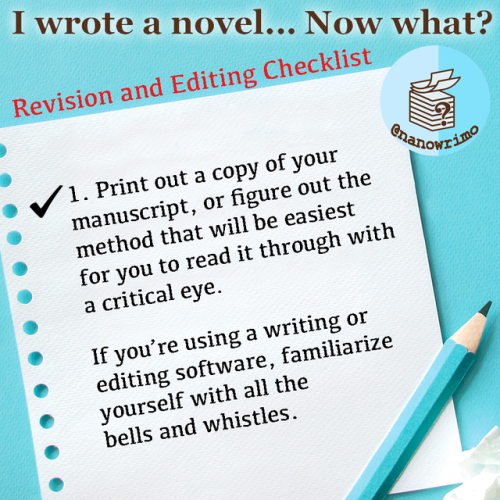

Inspiration for this step taken from Tomehbell's blog post: http://blog.nanowrimo.org/post/154469...

Inspiration for this step taken from Elizabeth Kracht's blog post: http://blog.nanowrimo.org/post/155628...

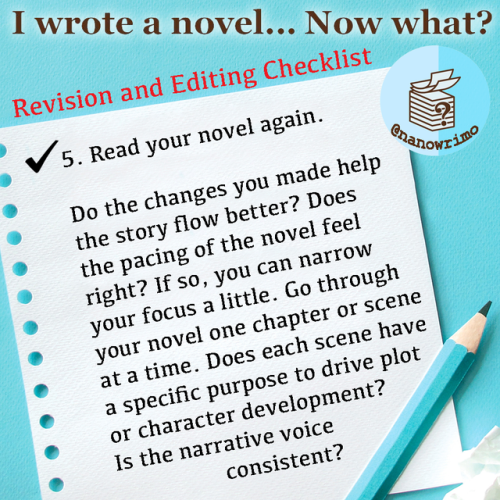

Inspiration for this step taken from Derek Murphy's blog post: http://blog.nanowrimo.org/post/156279...
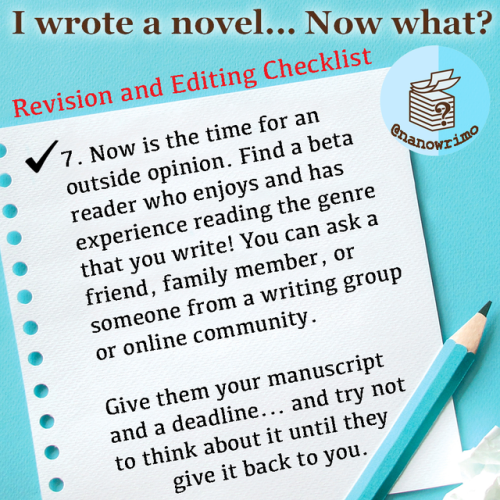
For more about finding beta readers, check out Jody T. Morse's post: http://blog.nanowrimo.org/post/155487...
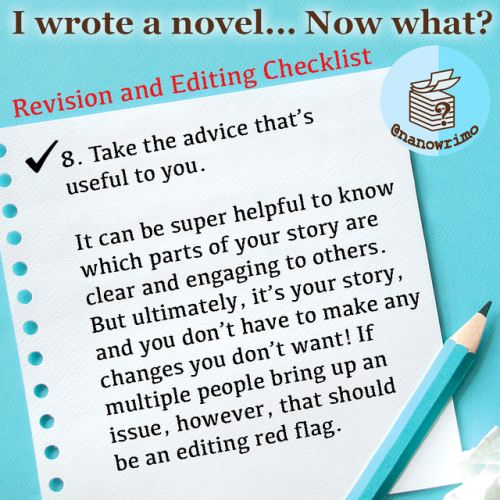
I Wrote a Novel… Now What? Your Revision and Editing Checklist
If you’ve completed a first draft of your novel, congratulations! However, after the hustle of getting that draft written, you may be wondering… what do you do with it now? This January and February, NaNoWriMo’s “Now What?” Months are here to help guide your novel through the revision, editing, and publishing process.
To start you off, we’ve taken some inspiration from previous blog posts to create this handy-dandy Revision and Editing Checklist. Don’t know where to start? Use this guide to help you navigate the tricky waters of novel revision!
January 9, 2019
The Beginning Writer’s Checklist

What do you need to be a writer? Maybe less than you think! Today, young writer and NaNoWriMo participant Larisa Greway is here to give you a handy checklist of the things you do and don’t need to be able to start writing:
Everybody has a story to tell, but too many people don’t write it down. Whether you’re 13 or 73, you might think writers are superhumans, and that a regular person could never be one. Well, that’s simply not true. And to prove that to you, here’s a list of things of the things you do and don’t need in order to be a writer.
1. The best equipment
You might think you can’t write a thing without that $5000 laptop with a holographic screen and rainbow backlit keys you barely even have to push down. Sure, it sounds amazing, but you don’t need it. You can write a story on an old computer, word processor, or even a typewriter. But that laptop you think you can’t do without? You can. Plus, a plain old pencil and a piece of paper will never go out of style.
2. Complete originality
Nothing is truly original. Every plot twist you come up with, every character’s desire, someone has written it down before. But your writing style is different from anyone else’s, and because of that you can put all the elements of a story together in a way that no one else can.
A quest + magic shoes + flying monkeys could equal the Wizard of Oz. Or it could equal an amazing story that nobody’s ever heard before. Don’t get discouraged if you can’t think of an amazing idea right off the bat. Instead, take a published story and figure out what twists and turns you can put in to make it completely your own.
You won’t be amazingly original. And that’s awesome.
3. A perfect first draft
People seem to think the story leaves the writer’s brain, gets onto paper, and goes to the publisher in one fell swoop. It doesn’t. Most writers’ brains are jumbled with character backstories, treasure maps, and plot twists, and all of it comes out on the page in a junkyard of words called a first draft. The process of editing comes later, when this thing you hold in your hands gets turned into a coherent story, but the first draft is almost always messy and as far from coherent as you can get.
Things You Do Need:1. Something to write about
Maybe you struggle with coming up with ideas. No problem: jump online and look up one of the thousands of story idea generators that exist there. The ideas they generate will be pretty random, but most of the time you can find one or two phrases that resonate with you.
A lot of writers have to struggle for their ideas, and that’s when they take a break. Get some fresh air and see the sun for a few minutes, and after you recharge head back to your desk. Getting up resets your brain, making it easier for a flash of inspiration to head your way.
That’s it. That’s all you need in order to start writing. Not as hard as you thought, huh? All you have to do is sit down on your bed or in your armchair and start typing. And when you don’t believe that you’re going to write the Great American Novel on your first try, it gets that much easier to conquer.
Larisa Greway’s first story was written when she was five years old, and she’d like to think that she’s improved since then. Her second home is Hogwarts (she’s a Hufflepuff), but she visits Camp Half-Blood every summer (daughter of Poseidon). Fantasy, science fiction, and dystopian books are her kryptonite. She’s currently rewriting her first NaNoWriMo novel, surrounded by a mountain of pillows, chocolate, and books.
January 7, 2019
6 Tips for Polishing Your NaNoWriMo Manuscript

NaNoWriMo is back with our Now What? Months, focused on helping you revise, edit, and publish your story. When it comes to perfecting our novels, we need all the help we can get! Today, author June Casagrande shares her advice for those NaNo novelists with a complete draft and who are wondering what comes next:
NaNoWriMo is all about fast. But when December (or January) rolls around and the mad dash has ended, it’s time to slow down and clean up the errors and infelicities that, left unchecked, will scream to the world that your novel wasn’t professionally edited. Here are tips for finding and fixing problems lurking in your manuscript.
1. Forget everything you’ve heard about grammar.The key word here is “heard.” Grammar myths spread by word of mouth, usually by well-meaning parents and misinformed teachers, are almost always false and, if taken too seriously, can hurt your writing. Contrary to popular superstitions, there is no rule against ending a sentence with a preposition, splitting an infinitive, or beginning a sentence with a conjunction. Real grammar has more to do with issues like subject-verb agreement, and making the meaning of your sentences clear.
2. Banish deadbeat adverbs.Here’s a secret of professional writing: a lot of adverbs are the hallmark of an amateur. Top authors don’t write, “Jane angrily yelled.” They write, “Jane yelled.” They don’t write, “That’s totally true.” They write, “That’s true.” Even adverbs that don’t seem so absurd can telegraph to readers that you’re not in the same league as bestselling authors.
Of course, adverbs exist for a reason. At times, they work beautifully. What’s the difference between the deadbeat adverbs and the ones that pull their own weight? Added information. If your adverb tells the reader something she wouldn’t otherwise know, it’s serving a purpose: “Sabrina opened the door slowly” conveys information that “Sabrina opened the door” does not. Compare that to “Stu quickly dashed out of the office,” whose adverb adds nothing. Chop it out: “Stu dashed out of the office.” To stay in your manuscript, every adverb should pass this survival test.
3. Watch for unclear antecedents.When you’re writing scenes with characters you’ve created, there’s never a question in your mind which character is doing what action. But your reader isn’t in your head. As you go through your manuscript, pay careful attention to your pronouns. Make sure every “he,” “she,” “they” and “it” clearly refers to the person or thing it represents, its antecedent. If not (“He punched him in the face”) replace pronouns with the nouns they represent (“Joe punched Bob in the face”).
4. Don’t squander your main clauses.A clause is a subject plus its verb: i.e. “Jonah cried.” In every sentence, the main clause is the top spot, the marquee position. The reader instinctively understands that your most important, most interesting information should reside here. Whenever possible, harness this power by making your subject three dimensional and your verb dynamic.
Avoid gerunds as subjects, as in “Crying is an act that Jonah engaged in.” Also avoid state-of-mind verbs in your main clause: “Penny realized that the roof tiles were coming loose and would soon start falling around her.” Someone having a realization about an impending emergency is almost never as engaging to the reader as the emergency itself: “The roof tiles were rattling loose. Any minute now, they would come crashing down on Penny’s head.”
5. Look for sentences you can break up.Sometimes, long sentences are masterful works of art. But those don’t often happen during NaNoWriMo. Sentences with multiple clauses, like “Because she looked out the window and saw it was already dark out, Emily grabbed her pepper spray,” might be better if each clause had its own sentence: “Emily looked out the window. It was already dark. She grabbed her pepper spray.”
6. Look for words you can chop out.If you said in ten words something you could have said in five, say it in five. If a sentence sounds bloated, pare it down. Here’s a thinly disguised passage from a real NaNoWriMo novel: “It all started sometime around the end of the millennium when the stock market went into a tailspin and my 401K lost sixty percent but I didn’t worry too much because I was sure I was, well, you know, destined for success.” Here’s how you could pare that down: “At the end of the millennium, the stock market went into a tailspin and my 401K lost sixty percent. But I wasn’t worried. I thought I was destined for success.”

June Casagrande is the author of The Joy of Syntax: A Simple Guide to All the Grammar You Know You Should Know and The Best Punctuation Book, Period. She writes the weekly self-syndicated “A Word, Please” column on language and grammar and podcasts at GrammarUnderground.com. See all her books at Penguin Random House.
Top photo by Anders Nord on Unsplash.
December 20, 2018
Season’s Greetings from NaNoWriMo!This blog will be going on...
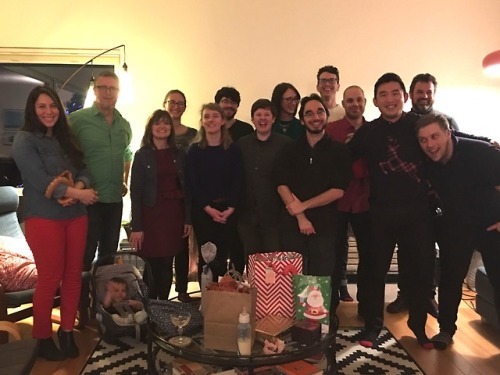
Season’s Greetings from NaNoWriMo!
This blog will be going on hiatus for a couple of weeks while NaNo HQ takes a little winter hibernation. Whatever holidays you celebrate (or have already celebrated!), we hope you’re able to take some time for yourself in the next few weeks, and that 2019 brings nothing but the best. Congratulations on all your hard-earned creative progress this year, and we’ll see you in the new year!
December 18, 2018
Would You Like to Write for the NaNoWriMo Blog?
No one knows NaNoWriMo like the people who participate! We’re looking for Wrimos to contribute to our blog for some upcoming series.
Interested? Just fill out this form, and we’ll get in touch! (Please note that we receive a high volume of interest in writing for the blog, and may not be able to respond to everyone. This is currently an unpaid opportunity.)
Are you a Municipal Liaison or Come Write In space coordinator? Fill out this form instead, we have a few specific questions we’d like to ask you!
Are you a Young Writers Program participant? Fill out this form instead so we can make sure that we attribute you correctly!
We’re looking for blog contributors again! We’re especially looking for some editing, revising, and publishing tips for our “I Wrote a Novel… Now What?” Months in January and February. Fill out the appropriate form for a chance to be featured on this blog!
December 17, 2018
Break Free from the Post-NaNoWriMo Blues with the 3 R’s of Recovery

Now that NaNoWriMo is over, you may be wondering what the next step is. Revision? Rewriting? Today, writer and participant Madeline Wright discusses the importance of recovering from your November marathon before revisiting your novel.
Whether or not you’ve crossed that 50,000-word mark in November, one thing is for certain. You are amazing for even attempting to crush NaNoWriMo. I hope that you took time to celebrate all that you’ve accomplished in the last month. Right now though, you may find yourself attempting to answer a question or two swirling in your head focused heavily on what’s next.
What happens when you’ve been writing for 30 days at a lightning-fast rate and then suddenly you’re not?
In answering this question, it’s normal to feel a vague anxiety around what you’re supposed to do over the next few weeks. You may wonder: Should I keep writing at this pace? Should I take a break? Should I pay any mind to this guilt creeping in now that I’ve definitely decided to do the latter?
With an easing of the gas pedal in any creative vehicle, it’s natural to experience a loss of momentum. You’ll have days where you don’t move forward at all which may induce a feeling of guilt. If you find yourself feeling this way, you’re not alone. And also, there’s absolutely nothing to feel guilty about!
Lots of support and guidance have been funneled through all communication channels to you during the challenge, but there isn’t a whole lot focused on ramping down after November (until now). Decompressing is an important part of this challenge too. If you don’t decompress then you may end up feeling a little lost, depressed, or left with an odd sensation of guilt.
First, dear writer, let’s acknowledge that it’s okay to take a break from your story. If you still feel the need to keep on writing at an accelerated rate until the last ‘i’ is dotted and final punctuation is in place, then consider taking some time to decompress. Doing this will help you with the post-challenge transition.
By decompressing you will ultimately find yourself further along faster than you otherwise would with these three R’s: relaxation, reflection, and regrouping.
RelaxationBe okay with writing nothing at all for a little while. You may let the productive momentum from November carry over into other projects you may have. But allow yourself a chance for rest. You’ve earned this much.
ReflectionTry writing something else by thinking about your overall experience. Write down some thoughts paying attention to what worked well and what challenges you’ve experienced. Note how you would do things differently if you could do NaNoWriMo all over again.
RegroupFocus on crafting a short-term plan to get you writing again and in the right direction for your next goal.
Check your region for a year-round write-in schedule (or propose one be made). Plan to meet up with fellow writers and keep each other motivated to work on your writing at a pace that works well for you.
As for me, over the next few weeks, I’ll be planning how to hit my writing goals for 2019 which includes finishing and revising my novel draft, as well as pursuing other writing projects. I will resolve to not feel guilty and rush through the three R’s because I know that telling my story will ultimately take as much time as I need it to take. I will also resolve that the time ‘I need it to take’ will be shorter than ‘taking my sweet time to make it happen’ which may fodder for a challenge for another day. NaNoEdMo, perhaps?
Now is the time to continue on in your creative journey. Go forth and write, or not. Here’s to a guilt-free December.

Madeline Wright is a freelance writer, product manager, and an avid reader who enjoys tackling creative challenges. With a BS from UCLA, a writing course from UCLA Extension, plus a few other writing classes under her belt she enjoys injecting humor and STEM concepts into her youth fiction oriented novels, whenever possible. She produces A Mad Vox, a podcast that explores the art of tackling ambitious challenges, like NaNoWriMo, and encourages you to try amazing things to make your inner kid proud. Connect with her on @amadvox on Twitter and Instagram, or become her Buddy on NaNoWriMo, where she goes by KwaS.
Photo by Joshua Chun on Unsplash.
December 14, 2018
The Power of Stories in the Face of Disaster

Earlier this year, parts of California were decimated by devastating fires. NaNoWriMo HQ is located in Berkeley, CA, so we’ve experienced some of the fallout from these disasters, and our hearts go out to those whose lives have been claimed or changed by the them. Today, writer Matt Forbes, one of the survivors of the Camp Fire that leveled Paradise, CA, shares how he’s using writing to help regain some hope in the aftermath of the fire
:
There’s something to be said about the power of stories. Over 25,000 people in Paradise, CA and surrounding areas share a terrible story of loss. On the morning of 8 November 2018, the Camp Fire started in the valley behind the local hospital, and by that same night the entire town was engulfed in flames. Over the course of one day, their stories changed forever to one marred by a devastating loss. People ran from their homes with nothing and some still couldn’t escape.
I won’t reiterate statistics here, but you can look them up online if you’re in the mood for shock and depression. Still, many were unharmed—physically—by the fire, escaping with their lives and families. I’m one of those people, but I refuse to be defined by the ashes of my home or to let that be the fate of so many others without some kind of fight. But I am armed with naught but a pen. Here is my plan to challenge this disaster:
1. PurposeI’m not anybody special, but everyone deserves to know it doesn’t take Someone Special to do something grand. I’m a writer through and through, so I asked myself, “What unique skill can I bring to fight this catastrophe?” The answer was obvious: I would write. But how can writing help the survivors—my friends, family, and townspeople? It would have to be something grand. Something wild.
2. PledgeNaNoWriMo is big. If you’re a writer who’s participated in it, you might understand that all too well—the way it made you whole. So what can be bigger for an aspiring writer than 50,000 words in a month? Of course! 50,000 words a month for an entire year. That’s 600,000 words, which is about what it takes to read Harry Potter from book one to the middle of book five or the length of the Hunger Games trilogy from start to finish, twice. This is a Year of Writing Months. The kind of madness only writers, savants, and fire victims have the fortitude to endure. This is what I will do, and I invite anyone daring enough to join me to come along. The progress of this endeavor will be something you can follow for inspiration and support, as shown by the…
3. PleaThe point of this struggle is to draw awareness to the Camp Fire and its victims. Follow along at https://nanowrimo.org/forum_comments/8052319 to see the progress, talk about your own struggles, and find support from other victims and sympathizers. As the year goes by, I hope that others will find it to help themselves and others. Stories heal and stories rally. Relief efforts have already started rising up in the wake of the Camp Fire—opposition to its destruction—and a few can be found in the thread mentioned above. But aid comes in all shapes and sizes, not just donations. If you know someone affected by the fire, reach out to them. If you know a firefighter or first responder, thank them for their service and bravery. People need clothes, blankets, and housing, but they also need encouragement and love. Reach out, no matter how large or small a way you can.
The town of Paradise is gone. Homes are gone. Lives are gone. But people become strong when faced with adversity, and this story doesn’t have to be the last one we tell. Even if you don’t reach out to the Camp Fire victims, there are always others in need. As climates shift, disasters will continue to crop up around the globe, and only we—the people—have the power to save one another. A revolution can start with something as simple as a single story. Some say the pen is mightier than the sword. Today—and this year—I hope it will be mightier than the fire.

Matt Forbes is a strong believer in the powers of friendship, courage, and storytelling as a means to overcome. He goes by his full name—Matt Forbes—and grew up playing D&D with friends that became lifelong. As a full-time DM of many years, storytelling turned into writing and became his passion. Finding NaNoWriMo in 2011, he started his journey figuring out how to challenge the struggle that ensues while following the strange and novel path of the writer.
Top image licensed under Creative Commons from Pacific Southwest Region 5 on Flickr.
December 12, 2018
NaNoWriMo 2018: By the Numbers
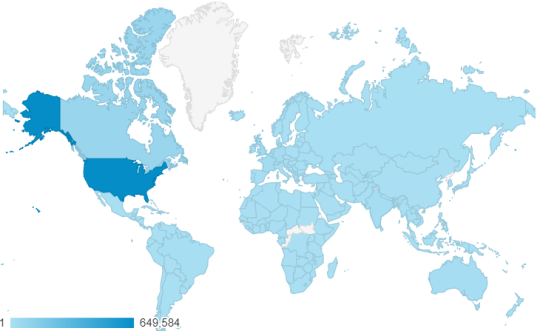
Check out our statistics for NaNoWriMo 2018! Our writers continue to write and achieve great things; in fact, more novelists reached 50,000 words than last year! Writers in our Young Writers Program also continued to crush it, with an overall win rate of over 40%. Read on for more information about this November’s numbers, leaders, and chart-toppers.
22,871 words written on average by those who started novels
YWP Breakdown64,374 novels started
26,183 winners (that’s almost 41%!)
11,820 classrooms participatedWebsite activity849,540 unique visitors (that many people would fill the University of Michigan Stadium—the largest in the U.S.—almost eight times)
22,338,654 pageviews
Top Ten Countries (by visits)
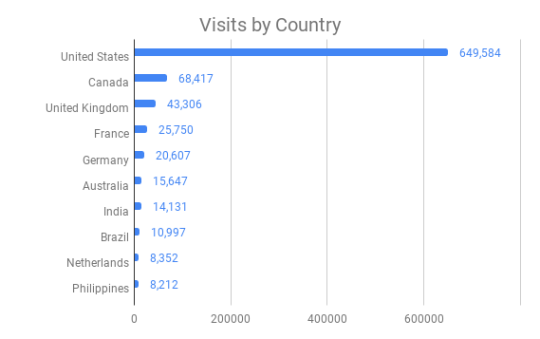 Top Fifteen Regions (by word count)
Top Fifteen Regions (by word count)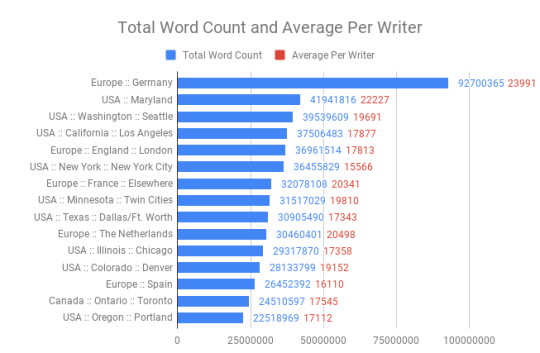 Genre Popularity by Novels Started
Genre Popularity by Novels Started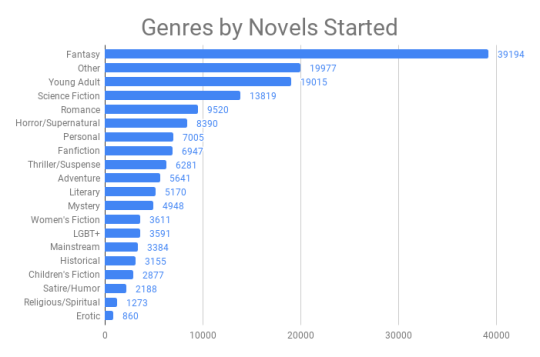
December 10, 2018
5 Ways to Treat Yo’ Self After NaNoWriMo

Now that November is over, you may be wondering how best to use your newfound free time. Will you keep writing? Or will you take a well-deserved break? Today, writer and illustrator Juliana Xavier shares her tips on how to relax and renew yourself after NaNoWriMo:
As NaNoWriMo’s 2018 session officially comes to an end, take a deep breath, pat yourself on the back and remember to Treat Yo’ Self—you’ve earned it!
Now that the month and the event are over and done with, what does one do? After all, it’s always bittersweet to be done with something you invested so much time and effort in. Stopping out of the blue can often leave some feeling lost. If that just happens to be you, maybe I can help!
Thinking back on the month, maybe you managed to write 50k in under a week; maybe you discovered writing 50k in a month was harder than you thought. Either way, what comes next might be just as important as what came before.
Here’s my personal plan on what to do next:
1. Do nothing.Is your brain fried? Can it no longer come up with good words to word good and write… well? That’s cool, and totally normal! That means it’s time for a little something we like to call “self care.” Sometimes the best self care on the planet is enjoying things that take no brain power at all, like laying in bed in your PJs while eating ice cream and watching cartoons.
2. Don’t touch that ‘script.Allow yourself not to touch your MS until you actually miss working on it. Treat it like you would treat your parents during summer camp or after moving out to go to college. You love them, but having some distance makes missing them more special… plus you’ll have more things to discuss that way (please call your parents, they miss you).
3. Consume junk food and/or entertainment.That chocolate you were hoarding as a reward for all your hard work? Go for it. It’s good to spend your time reading and watching things that allow you to have fun! Including bad stories. Why not watch that awful C movie your friends keep telling you to watch? Might be fun to figure out a way to rework the plot and make the story work!
4. Make writer friends.Investing in writing communities completely pays off. Don’t use people! Be kind and make friends. Form your writers’ coven. These are the people who will be there with you, help cheering you on in the same way you’ll cheer them on! Which brings me to…
5. Beta read (and be beta read ).If you’re not one already, consider doing this. Although you might not be quite there yet with your own MS, becoming a beta reader or critique partner often times leads to self improvement, along with the fact you’re helping others! Going through the experience yourself will help you know what you’ll need from your future readers! There are plenty of people out there who need this, but remember! Only offer if you plan to follow through.
And that’s basically it! If you decide or not to follow a similar plan to mine, it’s totally up to you. Just make sure to take care of yourself so you’ll be ready for the next writing event in your life, for you are a true NaNo champion.
Signed,
Your friendly neighborhood Wrimo participant.

Juliana Xavier is a writer, illustrator and sequential artist. SCAD alumna, all about that kid lit. Brazilian born but partially American grown. Works as a freelance artist and would love to draw your fantasy maps and book covers. Coffee is ok, but Thai bubble tea is the real MVP. Inkstress witch of the Writer Coven. Find her at: website, twitter, patreon. Like my writing? Buy me a ko-fi! For inquiries, feel free to e-mail at hey@juliejubz.com
Chris Baty's Blog
- Chris Baty's profile
- 63 followers



